Contact:
Gina Vergel
Senior Director of Communications
[email protected]
(212) 646-6534
Fordham University has partnered with the Westchester County Association, the City of Yonkers, STEM Alliance, Yonkers Partners in Education (YPIE), and Westhab, to help launch the Yonkers Zone (Y-Zone). By utilizing Citizens Broadband Radio Service (CBRS) spectrum, the newly deployed, digital opportunity zone provides free internet access to approximately 250 to 400 need-based households in downtown Yonkers.
Y-Zone is a digital ecosystem that incorporates three core principles. The first is establishing digital equity driven by a coalition of committed local stakeholders, including residents and program youth. Next, the project will aim to achieve widespread adoption through community input and engagement. Lastly, it plans to advance digital fluency by providing device ownership and tech education as well as connectivity.
“This is a fabulous opportunity,” said Jane Bolgatz, Ph.D., associate professor at the Graduate School of Education. “Fordham is supporting the project by researching how getting free WiFi helps people improve their experiences with education, employment, and healthcare. We are also working with the terrific high schoolers at YPIE, who are so creatively figuring out ways to tackle the problem of the digital divide.”
The project was made possible through support from US Ignite, the National Science Foundation (NSF), and Schmidt Futures. The Westchester County Association was selected as a Project OVERCOME grant recipient in March 2021. The Project OVERCOME grant provided awards to seven communities in a $2.7 million effort designed to connect the unconnected through novel broadband technology solutions. The U.S. NSF conceived of and provided $2.25 million in funding for the project, and Schmidt Futures provided an additional $450,000. US Ignite managed the selection process and continues to oversee these projects along with multiple efforts to connect the benefits of emerging technology with some of our community’s people in need.
“Now more than ever, there is a growing need to bridge the digital divide that exists in communities across the country,” said Mike Spano, mayor of the City of Yonkers. “I am so proud Yonkers families will be given an equitable solution to technology that supports the education of our students. Many thanks to our Y-Zone partners … for recognizing that affordable connectivity is vital to the success and future of the city.”
In order to qualify, residents must live in the service zone, which reaches from Glenn Park to Park Hill Avenue, and from downtown Yonkers to Nodine Hill. Click HERE to complete the application.
Access the latest information on Y-Zone at: YZone.Info. For more information on Project OVERCOME, please visit: www.US-Ignite.org
]]>

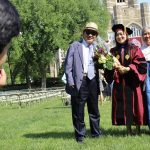
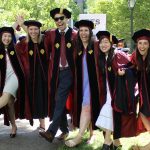


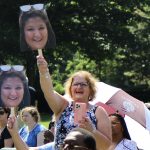


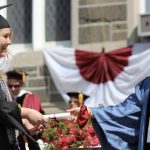
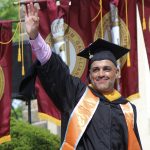
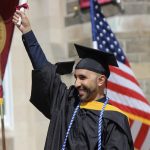
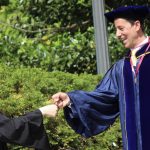
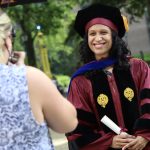
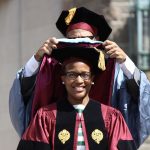
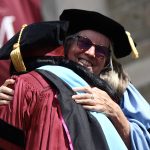 After a year-plus in which schools have faced immense challenges—and in which the need for compassionate educators has become even more pronounced—Fordham conferred degrees on 265 master’s, doctoral, and certificate students of the Graduate School of Education on Sunday.
After a year-plus in which schools have faced immense challenges—and in which the need for compassionate educators has become even more pronounced—Fordham conferred degrees on 265 master’s, doctoral, and certificate students of the Graduate School of Education on Sunday.
On a hot May afternoon, about 160 candidates walked in person, with their families and loved ones cheering from Edwards Parade. Following the graduates’ procession, Jane Bolgatz, Ph.D., associate dean for academic affairs and associate professor of curriculum and teaching at GSE, introduced Joseph M. McShane, S.J., president of Fordham, for an invocation, and GSE Interim Dean Akane Zusho, Ph.D., who addressed the graduates. Present in the crowd were Virginia Roach, Ed.D., former dean of GSE, and José Luis Alvarado, Ph.D., who will lead the school as dean beginning July 1.
“How we emerge from challenges helps to define who we are as human beings,” Zusho told the crowd, citing not only the COVID-19 pandemic but ongoing conversations around racial justice and education reform. “We need teachers, leaders, counselors, and psychologists who share in the fundamental belief that we can all learn and grow, and who can help their students, teachers, and clients live up to their fullest potential.
“Every student deserves to learn in an environment that encourages them to take risks, ask big questions, and make mistakes. Every student also deserves to know they are in a safe space where there is always a path to redemption through education, free of judgement. And that path begins with you.”
Students graduating across GSE’s degree and certificate programs echoed Zusho’s call for the need to change the world through education.
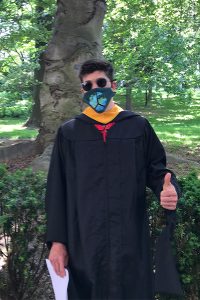
Brandon LaBella, who received a master’s degree in childhood education and is currently teaching fourth grade at Hillcrest Elementary School in Peekskill, New York, said that the M.S.T. program “made me feel so much more confident as a teacher. It’s incredible to be here surrounded by so many brilliant people, and I think everyone here is going to help make the world a better place.”
Speaking about what it’s been like to teach throughout the pandemic, LaBella added, “It’s been incredible to see the resilience of the students and all the teachers. It just gives me hope for the future that if we can take care of this, we can do anything.”
Darlyn Smith received her master’s in childhood special education through GSE’s online program and is currently teaching first grade at the Pingry School in Short Hills, New Jersey.
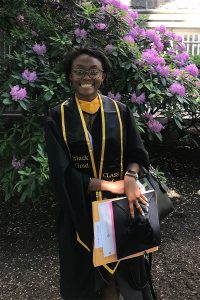
“I’ve always wanted to be a teacher, since I was very young,” said Smith. “It’s a great feeling to be here and get to see all the friends that I had online and get to interact and celebrate this wonderful occasion.”
Others reflected on the personal journeys of their years in graduate school. Teddy Reeves received his administration and supervision Ph.D. in GSE’s church and non-public school leadership program, and he said that the research process, while challenging at times, was an essential complement to his work as the curator and co-lead of religion at the National Museum of African American History and Culture in Washington, D.C.
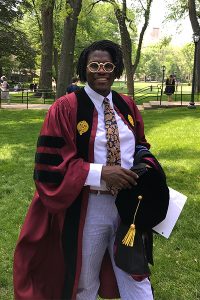
“It has been an amazing, difficult season of writing and researching and finding self,” Reeves reflected. “It’s labor intensive, but it’s a labor of love. It’s been great to mirror the work that I do professionally with the work I got to do at Fordham.”
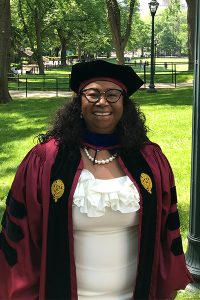
Magalie Exavier-Alexis, who completed her Ed.D. in educational leadership, administration, and policy while working as a school principal in Brooklyn’s District 13, also noted the challenges of balancing classwork and research with full-time work and a family, but she had no doubt that it was worth the effort.
“I’ve always known that my goal is to cross this finish line,” she said of receiving her doctorate. “I am elated! There are no words to describe my elation and my jubilation.”
Many graduates opted to attend GSE’s virtual ceremony, held on Monday, May 24. View the ceremony below and on YouTube.
]]>“It’s not just about being nice to your students—it’s about equity and justice. And there are consequences if you’re not culturally relevant and if you discipline based on unexamined biases,” said Patricia Capellan, a master’s student in the Graduate School of Education who co-presented an anti-racism workshop, “What We Teach and How We Teach It Matters: Creating and Implementing an Anti-Racist Curriculum,” on Sept. 21.
Capellan, an English language arts teacher-in-training, and Jane Bolgatz, Ph.D., associate dean for academic affairs and associate professor of curriculum and teaching at GSE, showed educators how to face their own biases and develop anti-racism initiatives and curriculum in their classrooms during the hour-long Zoom session. About 35 participants, ranging from current educators to teachers-in-training at GSE, tuned in for the workshop.
To set the stage for a sensitive conversation, the group established ground rules. They agreed to speak from their own experiences and to remember that people see things differently. They agreed to assume goodwill, but also attend to the impact of their words and actions. Finally, they agreed to practice patience and vulnerability, and that the anecdotes shared in the virtual space would remain private, but they would use the workshop lessons to make a difference in their own classrooms.
“You interact with students every day. They might be from completely different backgrounds from you, so it is important that you’re open to learning more about them,” Capellan, who co-designed the workshop with Bolgatz, said to the Zoom audience.
Acknowledging Personal Biases and Stereotypes
At the beginning of the workshop, participants debated several scenarios where cultural differences between students and educators created conflict in the classroom. In one scenario, a student told her teacher about the time her family smashed her cousin’s face into his birthday cake. The student said it was a fun family tradition, but her teacher called it “nasty” and “not very nice.”
This lack of cultural proficiency can lead to more serious consequences. According to 2017-2018 data from New York City schools, Black and Latinx students are more likely to be suspended than their white peers because of “inappropriate” behavior, ranging from being “too loud” to “aggressive,” said Capellan. But some students may behave “too” loudly because they belong to a culture that thrives on energetic social and family interaction, like Dominican culture, said one participant who identified as Dominican.
“It’s important that we acknowledge those implicit biases,” the participant said. “Once we can acknowledge these, I feel that these [disproportionate suspension]rates will go down because there will be teachers who can advocate for these students who may be misunderstood.”
The participants sat in silence for a minute as they examined their own stereotypes. Then they discussed how people have created damaging stereotypes—for example, about intelligence. When slaves were brought to the U.S., white people had to convince each other that Black people were less than human, said Bolgatz, so they argued that Black people were not intelligent.
“That stereotype was historically constructed and reinforced. It’s a really strong stereotype that you have to push against, and having a growth mindset is really going to help that,” said Bolgatz, who researches race and challenging racism in schools. “Fixed mindset is the idea that people are just born smart or not smart, whereas a growth mindset is that everybody, with a little help, can learn. We have to practice and make mistakes.”
Challenging Racism in the Classroom
Towards the end of the workshop, the participants addressed how they could challenge racism as teachers. They spoke about how color blindness fails to acknowledge the existence of white privilege and the struggles of people of color. They considered how biases could make an educator more likely to check whether a Black or brown student had plagiarized an assignment versus a white or Asian student, and how to combat those biases, including asking students to submit typed assignments with their personal ID number, rather than an easily identifiable name.
Just before the workshop ended, GSE students typed their final reflections into the Zoom chat box. One student decided to create a class census at the start of the school year where students could state how they identify. Another promised to practice withholding gut reactions and to consider the impact of their actions first.
“I will commit myself to learning about my students’ backgrounds, cultures and interests. I will always talk about subtle microaggressions or other forms of racism in my class, without making any student feel like they are being attacked for saying these things. I think incorporating these moments as learning lessons within the classroom is important and I appreciate Professor Bolgatz modeling that for us,” wrote one student. “As an ELA teacher I hope to include novels from different cultures in my class that aren’t strictly white-centered to allow students to hear and learn from other voices.”
]]>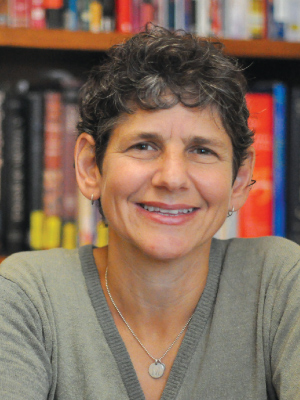
Photo by Patrick Verel
In a classroom populated with mostly white students, the white teacher constantly mixes up the names of the two black students, even though they look nothing alike. Is the teacher a racist?
As you consider your answer, think about how people exhibit what are known as “microaggressions,” inadvertent offenses to someone from a historically oppressed group.
Jane Bolgatz, Ph.D., associate professor of social studies education in the Division of Curriculum and Teaching at the Graduate School of Education (GSE), says they’re a lot more common than you might realize.
“The teacher isn’t trying to be offensive, but there’s a history of the dehumanizing of African Americans in this country. A student is probably thinking, ‘He’s short and kind of chubby, and I’m tall and thin. Why do you mix us both up? Because we’re both black?’ That happens frequently,” she said.
“That’s a microaggression because you didn’t mean anything by it, but it’s hurtful partly because it harkens back to a history of oppression.”
Talking with teachers about how subtle forms of racism and other forms of oppression can intrude into their classrooms is part of Bolgatz’s goal of preparing all children for success.
“One of the things that happens in classrooms is teachers have lower expectations of children of color,” said Bolgatz. “What I care about is teaching teachers to have the dispositions, knowledge, and skills to be able to move their students to where they need to be, so they can succeed academically.”
Part of it just has to do with teaching techniques, she said, “but part of it has to do with dispositions that are shaped by our cultures’ messages about race.”
In addition to microaggressions, Bolgatz promotes awareness of “stereotype threat,” which is the idea that when a stereotype matters to people, then they are likely to be distracted by the fear that their actions will confirm the stereotype.
Women taking high-level math courses, for example, are acutely aware of the perception that women are inherently bad at math. Unconsciously, worrying about confirming that stereotype can distract them, causing them, in a seemingly self-fulfilling prophecy, to not perform as well as they might otherwise.
Bolgatz, whose publications include “What Color was Joan of Arc’s Hair?: Developing Critical Literacy through Historical Thinking Skills,” in Critical Literacy as Resistance: Teaching for Social Justice Across the Secondary Curriculum (Peter Lang Publishing, 2008) and “Teachers Initiating Conversations about Race and Racism in a High school Class,” in Perspectives on Human Differences: Selected Readings on Diversity in America (Pearson Education, 2011), said there are proven techniques for overcoming this tendency.
“If you say to them, ‘This is math test, and it’s been proven that gender doesn’t impact results of this test at all—it’s just a test of your problem-solving skills,’ women will do just as well as men,” she said.
In other words, people who are threatened need to hear, “Hey, the stereotype is not going to be working here, get that out of your brain,” she said.
For the last two years, Bolgatz has focused her energies on the Clinically Rich Teacher Preparation Pilot Program, a $2.5 million grant from the New York State Education Department that she and the GSE won in 2011. The first cohort of teacher candidates graduated last year, and another cohort started in June. The grant places teacher candidates in high-needs schools, beginning with summer school. Bolgatz said the goal is to “develop teacher eyes.”
“Instead of waiting until September to have teachers do their student teaching and get their feet wet, through this program they’ve already been working with small groups of students and figuring out, ‘What does it mean to be a teacher?’” she said.
Bolgatz said the pilot program also fosters greater emphasis on communication between professors like herself and cooperating teachers who are running the classrooms in partner schools. Currently, professors instruct teaching candidates at the university and the candidates return to their schools, where a “cooperating teacher” oversees them.
“The idea here is that we’re helping to facilitate better communication between the cooperating teacher and the professor. I find out from the cooperating teacher that the student-teacher needs to use a certain kind of lesson plan format, and the teacher finds out from me that we have a new technique for doing small groups with students . . . together we can reinforce each other when the teacher candidate comes into my classroom.”
Teacher candidates in the pilot program agree to work for four years in high needs schools. Since many of the schools have majority black and Latino populations, attention to race is a must.
“My teacher candidates have to have a clue about what racial dynamics are going on there in order to have an impact on the academic achievements of their students,” she said.
]]>
Five Fordham University faculty members have won 2007 National Jesuit Book Awards given out by Alpha Sigma Nu and the Association of Jesuit Colleges and Universities.
Receiving the awards were Robin Andersen, Ph.D., professor of communication and media studies, for A Century of Media, A Century of War (Peter Lang, 2006); Jane Bolgatz, Ph.D., assistant professor of social studies education, for Talking Race in the Classroom (Teachers College Press, 2005); and Albert N. Greco, Ed.D., professor of marketing, Clara Rodríguez, professor of sociology, and Robert M. Wharton, Ph.D., area chair of management systems, for The Culture and Commerce of Publishing in the 21st Century (Stanford Business Books, 2007).
“We are very honored,” said Rodríguez, whose book analyzes the sometimes conflicting cultural and commercial themes that influence all segments of the $54 billion book industry in the United States. “This book began as a follow-up to an earlier classic work by Lewis A. Coser, Charles Kadushin and William Powell. … It then evolved into something a little different.”
Greco said the book is unique because he and his co-authors studied the cultural and commercial forces of the book industry, something few academics have done.
“I assume our empirical data and analysis and our comprehensive understanding of the industry might have interested the reviewers,” he said.
Bolgatz, who taught language and social studies for five years at an Iowa high school while working on her doctoral degree, said her book is geared at helping teachers develop the knowledge, skill and confidence to successfully address racial controversies in their classrooms.
“I was frustrated with not being able to have conversations with my students, or my fellow teachers, about racism,” she said. “They treated it as if it was a thing of the past. There were no books to refer to so I decided to write my own. And the title really says it all—it’s about talking race in the classroom.”
Andersen’s book, which has been lauded in reviews for being “cogently written” and “uncompromising in its ethical stance,” evaluates the long history of press coverage and media representations of American wars in the 20th century.
“I am absolutely thrilled to have received [the award],” Andersen said.
Alpha Sigma Nu and the Association of Jesuit Colleges and Universities award four book prizes each year in a specific category in a range of disciplines from the humanities to science. The category for the 2007 awards was professional studies, which encompasses everything from business to law. There were 60 entries this year from 16 Jesuit colleges and universities. The award carries a $1,000 prize.
The book awards are open to all faculty and administrators who have published a book in the past three years. The books are judged by scholars on the basis of scholarship, significance of topic to professors across several disciplines, authority in interpretation, objectivity, presentation and style.
]]>